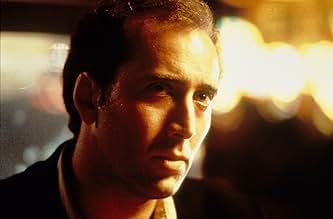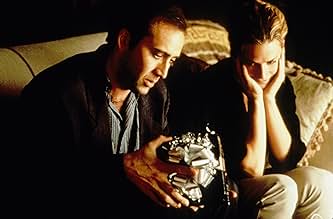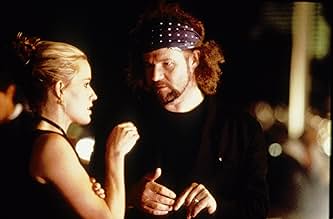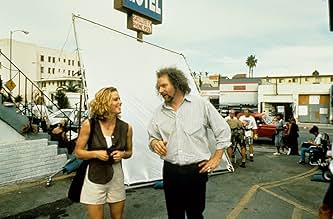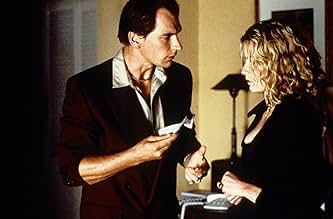Ben Sanderson, un guionista de Hollywood que lo perdió todo por a su alcoholismo, llega a Las Vegas para beber hasta morir. Allí conoce a Sera, una chica de la calle.Ben Sanderson, un guionista de Hollywood que lo perdió todo por a su alcoholismo, llega a Las Vegas para beber hasta morir. Allí conoce a Sera, una chica de la calle.Ben Sanderson, un guionista de Hollywood que lo perdió todo por a su alcoholismo, llega a Las Vegas para beber hasta morir. Allí conoce a Sera, una chica de la calle.
- Dirección
- Guión
- Reparto principal
- Ganó 1 premio Óscar
- 32 premios y 30 nominaciones en total
Albert Henderson
- Man at Strip Bar
- (as Al Henderson)
Reseñas destacadas
"Leaving Las Vegas" is an insightful, harrowing experience about the binding forces of true romance, the power of encouragement and compassion, and the tragic effects of alcoholism. The performances are absolutely astounding: Nicholas Cage delivers one of the most unforgettable, genuine, and human performances ever captured on film (a well-deserved Oscar for every reason), and Elisabeth Shue, as his soul provider and protector through the trauma of his alcoholic turmoil is sentimental, passionate, and definitely deserving of the Oscar for Best Actress in 1995, providing us with the eye of Ben Sanderson's heart and soul, as his equally troubled lover who has pledged to stay with him through tears and trials. Director Mike Figgis is intensely effective in following the many turmoils of Sanderson as he copes with terminal alcoholism, even going so far as to declaring he will "drink himself to death in Las Vegas", and the effects of his struggle upon his functions, health, and spirit, as well as the corresponding attributes of his loyal lover, Sara. I'm certain that anyone who has experienced the turmoil of alcoholism or has been deeply involved with such an abuser will gravely appreciate the realism and depth of this film to address the egregious effects of drinking constantly, and how this alcoholism tears many lives literally apart. I was horrified by Sanderson's dependence upon alcoholism as a substitute for happiness and control, and Nicholas Cage's uncanny human performance, with all of his appropriate, convincing twitches and erratic movements, enhanced the compassion and torment I felt for this character, who has literally surrendered his life to this terrible disease of alcoholism. We gasp in horror as we see Sanderson taking a shower with a bottle of gin in hand, and trembling to the refrigerator for a bottle of vodka: these are the true, tragic symptoms of alcoholism, and this film does an excellent job in addressing them. A brilliant, tragic, yet extremely essential study of the disease of alcoholism and how it can destroy every aspiration, every desire, and every state of consciousness we have within ourselves, when we are constantly craving "one more bottle of vodka" 24 hours a day, 7 days a week... Nicholas Cage delivers one of the most heartfelt and eerily convincing performances in the history of film, and this is one lamentable, subliminal look at one of the saddest and unnecessary addictions in humans: striving to either enhance, better, or in this case, destroy their lives in constantly drinking intoxicating and deadly substances. Sanderson to Sara: "You can never make me stop drinking"--- the sad, yet frighteningly real state of mind of a disparaged, hopeless, alcoholic. **** out of ****
If Mike Figgis never made another film, and Nick Cage and Elizabeth Shue retired after making Leaving Las Vegas, they would have done so with impunity. Both actors are superb, and bring the excellent screenplay to life with the help of some masterful dramatic cinematography.
Cage plays a suicidal alcoholic who has come to Las Vegas to drink himself to death, and Shue plays the unexpected problem - a prostitute who falls in love with him. The only reason this film did not receive a ten from me is the voice-over technique which was tastefully minimal, but, in my opinion, the only mistake the director made. It does help to provide closure, but I felt that closure was an unnecessary compromise here.
This is not an entertaining film, and in truth, I am surprised by its popularity among typical audiences. It is a serious film, and a work of art, but fun is not to be found here. DO NOT see this film if you dislike feeling emotionally drained and ethically challenged, and DO NOT see it if you are very prone to boredom, or easily offended by sexual violence, substance abuse and the horror of daily life on the street.
This is an intensely sad film about love shared by people who are caught in the gravity of their lives and can not escape. It is also a story of redemption and respect, found in improbable places. It is NOT a fun-filled frolicking romantic comedy, but rather, the opposite, and it achieves a beauty, dignity and power almost unique among films treating such starkly real and disturbing subjects.
Cage plays a suicidal alcoholic who has come to Las Vegas to drink himself to death, and Shue plays the unexpected problem - a prostitute who falls in love with him. The only reason this film did not receive a ten from me is the voice-over technique which was tastefully minimal, but, in my opinion, the only mistake the director made. It does help to provide closure, but I felt that closure was an unnecessary compromise here.
This is not an entertaining film, and in truth, I am surprised by its popularity among typical audiences. It is a serious film, and a work of art, but fun is not to be found here. DO NOT see this film if you dislike feeling emotionally drained and ethically challenged, and DO NOT see it if you are very prone to boredom, or easily offended by sexual violence, substance abuse and the horror of daily life on the street.
This is an intensely sad film about love shared by people who are caught in the gravity of their lives and can not escape. It is also a story of redemption and respect, found in improbable places. It is NOT a fun-filled frolicking romantic comedy, but rather, the opposite, and it achieves a beauty, dignity and power almost unique among films treating such starkly real and disturbing subjects.
Leaving Las Vegas (1995)
**** (out of 4)
Depressing account of a man (Nicholas Cage) who goes to Las Vegas to drink himself to death and once there he strikes up a relationship with a prostitute (Elisabeth Shue). Going back and watching this film after so many years had a lot of things going through my mind. Such as the first time I watched this it was in the theater as the second part of a double feature with DEAD MAN WALKING. Talk about a depressing four hours in the theater. The second thing it reminded me of was what a terrific actor Cage was and how at the time many people were calling him one of the greatest of his generation. I bring this up considering the type of films Cage is currently doing. LEAVING LAS VEGAS is without question a very dark and depressing film and it always amuses me that people attacked the picture for this. I mean, there are several films each year that shows the fun side of drinking so I always find it strange that so many could object to a film showing the ugly side. I can understand people not wanting to sit through a nearly two-hour suicide movie but at the same time those who can stomach the story are going to be shown one of the best performances from this era. Cage is simply marvelous as the alcoholic who goes on a death wish for reasons we're not fully told. It's funny but the screenplay really doesn't give us much insight to either character other than both are troubled, alone and find some sort of comfort with each other. This love story between the two certainly isn't all that casual or romantic but it's quite unique in its own way. The way Cage controls this character, his various emotions and the physical nature of his body falling apart are simply amazing to watch. It really reminds one of how great he can be when the material is right. Shue also turns in the best performance of her career and you can really see the pain in her eyes as this man she loves is slowly dying. Julian Sands is also quite effective in his few scenes. Director Mike Figgis does an extremely good job with the material but a lot of credit also needs to go towards his film score. LEAVING LAS VEGAS isn't a very pretty movie to watch but then again, why would anyone expect alcoholism to be pretty?
**** (out of 4)
Depressing account of a man (Nicholas Cage) who goes to Las Vegas to drink himself to death and once there he strikes up a relationship with a prostitute (Elisabeth Shue). Going back and watching this film after so many years had a lot of things going through my mind. Such as the first time I watched this it was in the theater as the second part of a double feature with DEAD MAN WALKING. Talk about a depressing four hours in the theater. The second thing it reminded me of was what a terrific actor Cage was and how at the time many people were calling him one of the greatest of his generation. I bring this up considering the type of films Cage is currently doing. LEAVING LAS VEGAS is without question a very dark and depressing film and it always amuses me that people attacked the picture for this. I mean, there are several films each year that shows the fun side of drinking so I always find it strange that so many could object to a film showing the ugly side. I can understand people not wanting to sit through a nearly two-hour suicide movie but at the same time those who can stomach the story are going to be shown one of the best performances from this era. Cage is simply marvelous as the alcoholic who goes on a death wish for reasons we're not fully told. It's funny but the screenplay really doesn't give us much insight to either character other than both are troubled, alone and find some sort of comfort with each other. This love story between the two certainly isn't all that casual or romantic but it's quite unique in its own way. The way Cage controls this character, his various emotions and the physical nature of his body falling apart are simply amazing to watch. It really reminds one of how great he can be when the material is right. Shue also turns in the best performance of her career and you can really see the pain in her eyes as this man she loves is slowly dying. Julian Sands is also quite effective in his few scenes. Director Mike Figgis does an extremely good job with the material but a lot of credit also needs to go towards his film score. LEAVING LAS VEGAS isn't a very pretty movie to watch but then again, why would anyone expect alcoholism to be pretty?
Having recovered from the mind-numbing Heat, a supposed character study, I was eager to sink my teeth into a different 1995 gem and I found it here with Leaving Las Vegas. With only two important characters, the entire film rests heavily on the shoulders of Nicolas Cage and Elisabeth Shue, and neither of them disappoint.
Of the two, Nicolas Cage is the Oscar winner and the truly deserving one at that. He is simply hypnotic as Ben Sanderson, an alcoholic so far gone he doesn't even remember why he wants to die. His withdrawal scenes are so real they are upsetting, whereas his drunken charisma is so real its almost funny. The balance that Cage strikes really highlights how tragic his character really is. He conveys hatred and rage and loneliness and despair, and you will be so sad yet so hooked that its impossible to look away. Elisabeth Shue gets off to a slower start than Cage, but she is still an endearing, emotional character, capable of great things.
The writing is very good, giving Cage the perfect, pitiful dialogue in order to serve his woeful character, and even throws in a hypnotic monologue or two. The best thing that Figgis achieves in this film is his cruel and deliberate intersplicing of mood-killing incidents (invariably caused by alcohol) between the moments of love and passion that Shue and Cage share. It is a relentless reminder that their love story is completely doomed. Sting's My One and Only Love is all over this film, which I thought was a very good choice, in addition to the beautiful and haunting score.
The final act focuses a little too much on Shue and not enough on Cage, and whilst their final scene together was appropriately pathetic to suit the tragedy of the film, I couldn't help but feel less engaged. I also didn't enjoy Shue's constant commentary, given that it doesn't really go anywhere.
But between the raw passion of Nicholas Cage and the uncompromising guiding hand of Mike Figgis, any complaints I could ever have otherwise found in Leaving Las Vegas are completely washed away.
Of the two, Nicolas Cage is the Oscar winner and the truly deserving one at that. He is simply hypnotic as Ben Sanderson, an alcoholic so far gone he doesn't even remember why he wants to die. His withdrawal scenes are so real they are upsetting, whereas his drunken charisma is so real its almost funny. The balance that Cage strikes really highlights how tragic his character really is. He conveys hatred and rage and loneliness and despair, and you will be so sad yet so hooked that its impossible to look away. Elisabeth Shue gets off to a slower start than Cage, but she is still an endearing, emotional character, capable of great things.
The writing is very good, giving Cage the perfect, pitiful dialogue in order to serve his woeful character, and even throws in a hypnotic monologue or two. The best thing that Figgis achieves in this film is his cruel and deliberate intersplicing of mood-killing incidents (invariably caused by alcohol) between the moments of love and passion that Shue and Cage share. It is a relentless reminder that their love story is completely doomed. Sting's My One and Only Love is all over this film, which I thought was a very good choice, in addition to the beautiful and haunting score.
The final act focuses a little too much on Shue and not enough on Cage, and whilst their final scene together was appropriately pathetic to suit the tragedy of the film, I couldn't help but feel less engaged. I also didn't enjoy Shue's constant commentary, given that it doesn't really go anywhere.
But between the raw passion of Nicholas Cage and the uncompromising guiding hand of Mike Figgis, any complaints I could ever have otherwise found in Leaving Las Vegas are completely washed away.
Not unlike John Huston's Under The Volcano, Leaving Las Vegas borrows from Greek mythology, obliquely mirroring the tragedy and pathos of Orpheus' failed attempt to rescue his dead wife, Eurydice, from Hades. Mike Figgis obliges us with a helpful hint in the scene where Nicolas Cage gives Elizabeth Shue a present of earrings: Greek cameos.
As in the ancient tale, love challenges the inevitability of death, although, in the case of LLV, roles are upended and sometimes blurred, and Orphean references are either thinly disguised, or non-specific to the point of being thoroughly sublimated. Academic, to be sure, but completely acceptable as long as LLV can sustain itself and remain engaging. And it surely does, thanks to Figgis' intelligent script and direction, Cage's role as a down-and-out writer and his protracted self-destruction, and Shue's portrayal of a lonely hooker, lifting that old bromide beyond what could have been routine, to a level not seen since Jane Fonda's character in Klute. Excellent performances all around.
With all that said, this film is not for everyone (in particular those who only respond to gratuitous sex, car chases, and mindless pyrotechnics). The lurid depictions of despair, self-loathing, and violence could put off even the most hardened social worker. In my mind's eye, I could see psychiatrists amongst the theater audiences, furiously jotting down their observations. Understandable; the two principal characters are, in the common parlance, screwed up. One cannot cope with failure, so decides to opt out, while the other does cope, but only barely, existing along the ragged edges of what passes for society in Nevada Hell. These details, though, tend to outline and, indeed, strengthen the true heart of this film: Sacrifice and Unconditional Love.
If this film is not for everyone, then who is it for? Those with real life experience and the maturity gained thereby. Those with strong emotional constitutions. Anyone appreciative of impassioned performances. Freudians. Alcoholics, recovering and otherwise. Pimps. Priests. Classicists. Petty whiners in need of perspective. And, more than anyone else, couples who plan on breaking up. In sickness and in health, 'til death do us part. 9.5 out of 10.
As in the ancient tale, love challenges the inevitability of death, although, in the case of LLV, roles are upended and sometimes blurred, and Orphean references are either thinly disguised, or non-specific to the point of being thoroughly sublimated. Academic, to be sure, but completely acceptable as long as LLV can sustain itself and remain engaging. And it surely does, thanks to Figgis' intelligent script and direction, Cage's role as a down-and-out writer and his protracted self-destruction, and Shue's portrayal of a lonely hooker, lifting that old bromide beyond what could have been routine, to a level not seen since Jane Fonda's character in Klute. Excellent performances all around.
With all that said, this film is not for everyone (in particular those who only respond to gratuitous sex, car chases, and mindless pyrotechnics). The lurid depictions of despair, self-loathing, and violence could put off even the most hardened social worker. In my mind's eye, I could see psychiatrists amongst the theater audiences, furiously jotting down their observations. Understandable; the two principal characters are, in the common parlance, screwed up. One cannot cope with failure, so decides to opt out, while the other does cope, but only barely, existing along the ragged edges of what passes for society in Nevada Hell. These details, though, tend to outline and, indeed, strengthen the true heart of this film: Sacrifice and Unconditional Love.
If this film is not for everyone, then who is it for? Those with real life experience and the maturity gained thereby. Those with strong emotional constitutions. Anyone appreciative of impassioned performances. Freudians. Alcoholics, recovering and otherwise. Pimps. Priests. Classicists. Petty whiners in need of perspective. And, more than anyone else, couples who plan on breaking up. In sickness and in health, 'til death do us part. 9.5 out of 10.
¿Sabías que...?
- CuriosidadesAuthor John O'Brien, on whose novel this movie is based, committed suicide two weeks after the movie went into production. Director Mike Figgis contemplated abandoning the project, but decided the film would make a good memorial for O'Brien.
- PifiasYuri is supposed to be swearing in Latvian on the phone. In fact, he speaks gibberish.
- Citas
Ben Sanderson: I don't know if I started drinking 'cause my wife left me or my wife left me 'cause I started drinking, but fuck it anyway.
- Créditos adicionalesThe opening credits do not appear until fifteen minutes into the film.
- Versiones alternativasLaserDisc version is unrated and contains more sexually explicit footage. First pressings of the VHS versions also contained this footage but later pressings did not. The Unrated Edition has also been released on DVD and Blu-ray and runs 112 min.
Selecciones populares
Inicia sesión para calificar y añadir a tu lista para recibir recomendaciones personalizadas
Detalles
- Fecha de lanzamiento
- País de origen
- Sitio oficial
- Idiomas
- Títulos en diferentes países
- Adiós a Las Vegas
- Localizaciones del rodaje
- River Palms Resort Casino - 2700 South Casino Drive, Laughlin, Nevada, Estados Unidos(interiors, as Gold River Casino and Resort)
- Empresas productoras
- Ver más compañías en los créditos en IMDbPro
Taquilla
- Presupuesto
- 3.600.000 US$ (estimación)
- Recaudación en Estados Unidos y Canadá
- 32.029.928 US$
- Fin de semana de estreno en EE. UU. y Canadá
- 70.864 US$
- 29 oct 1995
- Recaudación en todo el mundo
- 32.029.928 US$
- Duración
- 1h 51min(111 min)
- Color
- Mezcla de sonido
- Relación de aspecto
- 1.66 : 1
Contribuir a esta página
Sugerir un cambio o añadir el contenido que falta


